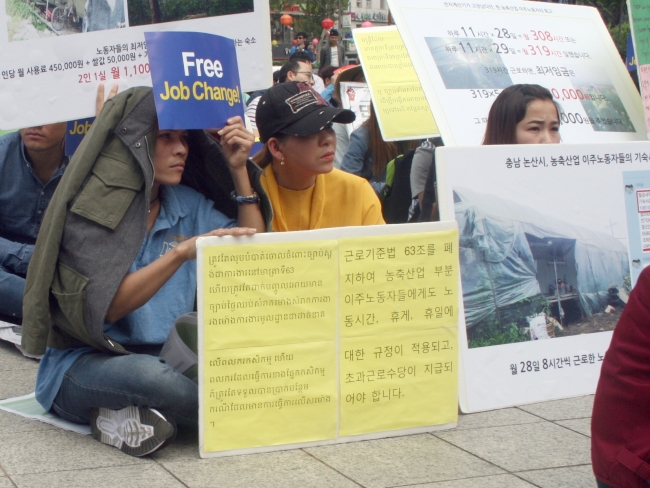Migrant workers staged a rally in central Seoul on Sunday to call for improved working conditions.
About 200 workers gathered in front of the Bosingak Bell next to Jonggak Station, demanding in particular the replacement of the Employment Permit System through which workers on E-9 visas are hired.
The workers later joined hundreds of thousands of Korean workers at a larger rally in Daehangno, Seoul.
Udaya Rai, president of the Seoul-Gyeonggi-Incheon Migrants’ Trade Union, said that more workers had joined the union since last year, during which the MTU had been given official recognition after a 10-year legal battle. But he said the situation in workplaces has not improved.
 |
Migrant workers listen to speakers at a May Day rally in front of the Bosingak Bell in central Seoul on Sunday. (Paul Kerry/The Korea Herald) |
Rai said that the main problem with the EPS system was the lack of freedom to change workplace. Under the system, workers can change jobs with employers’ permission or if they are otherwise unable to work there for reasons that are not their fault, but Rai said the effect was to put all the power in the hands of the employer.
“If there is violence or if there are rights abuses, unpaid salary, they can’t change (workplace),” he said.
“If they cannot tolerate the situation, they run away and become undocumented.”
“They should be legalized and allowed to work here because they became undocumented due to bad rules.”
He said that, by his own estimate, 70 to 80 percent of workers worked more than 10 hours a day and on weekends, with the situation particularly difficult in the agricultural sector.
Ma Khin May Htar, president of Suwon Migrants Center, a support organization for migrant workers funded by members and donations, also said that the situation was particularly bad for agricultural workers.
“The worst is working in the farms. They have to work from 6 a.m. to 8 p.m. every day and they have to work every day, with only one or two days off a month,” she said.
“And they have very poor quality housing. Sometimes they have to share, men and women together. And some companies give housing but they charge too much for that,” she said, adding that a worker might receive a minimum wage of 1.2 million won a month but have 400,000 won taken out for housing.
Rai made similar observations about housing, saying that employers were only supposed to charge 10 percent of salaries. “The EPS system gets worse day by day,” he said.
He also said that there were still problems with Departure Guarantee Insurance – the equivalent to statutory severance pay for EPS workers.
“Under the law, when (other) workers leave the company the boss has to give him (severance) within 14 days, but migrant workers have to leave Korea (before that 14-day deadline is issued),” he said.
He said that this causes problems if the money is not paid.
“We can appeal but the process is very difficult. We can’t hope to get (DGI),” he said.
“We have to prepare many papers and these papers are very difficult to prepare from abroad. Only a small number of people know how to do it.”
By Paul Kerry (
paulkerry@hotmail.com)








